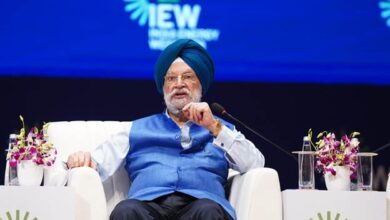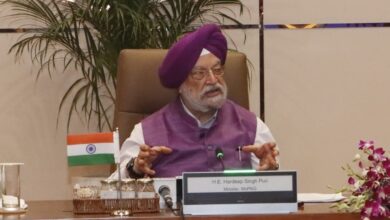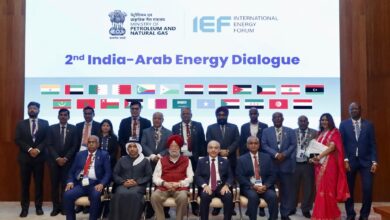RINL – SAIL Remerger Could Soon Be A Reality ?!?!
There has been a long standing demand from various organizations and pressure groups for the remerger of the two steel PSUs

The Rashtriya Ispat Nigam Limited (RINL), the corporate entity of the Visakhapatnam Steel Plant (VSP), has been facing severe financial difficulties, prompting significant demands for a strategic merger with the Steel Authority of India Limited (SAIL). The Steel Executives Federation of India (SEFI) and the Visakhapatnam Steel Executives Association (SEA) have been actively advocating for this merger.
Recently, SEFI representatives presented the proposal to the Union Minister of Steel, H D Kumaraswamy, while SEA members discussed the matter with Ministry of Steel Joint Secretary Vinod Kumar Tripathi.
Earlier, the National Confederation of Officers Associations of Central Public Sector Undertakings (NCOA) had also appealed to Prime Minister Narendra Modi for this merger.
READ ALSO : https://indianpsu.com/ncoa-appeals-to-pm-modi-for-merger-of-rinl-with-sail/
Adding to the advocacy efforts, the Communist Party of India (Marxist) Visakhapatnam district committee has demanded an immediate halt to plans for selling VSP’s lands and assets, which are valued at around Rs 500 crore and are located in major cities across India.
Sources told www.indianpsu.com that there is a definite big debate going on over this issue within the Ministry of Steel in which the concerned Union Minister, HD Kumaraswamy is showing keen interest.
Background of Visakhapatnam Steel Plant (VSP)
The establishment of VSP was a significant achievement following a decade-long movement known as “VisakhaUkku- AndhrulaHakku.” This movement saw substantial sacrifices, including the loss of academic years for thousands of students and the lives of 32 people. The creation of VSP involved evacuating 64 villages and acquiring 22,000 acres of land. Initially estimated to cost Rs 2,400 crore in the early 1980s, delays in fund release from the Government of India (GoI) increased the project cost to Rs 8,500 crore. Unlike other SAIL units, which received GoI investment as equity, RINL received loans and preferential shares, resulting in financial losses even before production began. Additionally, while other steel plants were allotted captive iron ore mines, RINL has not received any, resulting in annual losses of Rs 800-1000 crore due to iron ore procurement costs.
Despite these challenges, the plant began production in 1989-90 and provided substantial employment opportunities. However, in the mid-1990s, the plant was nearly referred to the Board for Industrial and Financial Reconstruction (BIFR) due to accumulated losses. Former Prime Minister A B Vajpayee intervened to convert loans into equity and preferential shares, which helped the plant turn around financially and start making profits.
Financial Contributions and Losses
RINL/VSP has made significant contributions to the exchequer, with around Rs 4,900 crore invested by the GoI in the 1980s. The plant has generated about Rs 40,000 crore for the central government and Rs 12,000 crore for the state government in taxes, besides paying Rs 1,300 crore in dividends to the central government. Despite a turnover of around Rs 1.5 lakh crore and profits of Rs 10,391 crore, RINL has faced losses due to various uncontrollable factors.
Reasons for Current Financial Troubles
- Lack of Captive Mines: RINL does not have captive mines for iron ore and coking coal, which are major raw materials for steel production and significantly impact production costs. As a result, RINL’s raw material cost is 63% of the total cost, compared to 48% for SAIL and 35% for TATA, both of which have captive mines.
- High Procurement Costs: RINL procures iron ore from NMDC at market prices, leading to annual losses of Rs 800-1000 crore. This situation is exacerbated as the plant’s iron ore consumption is set to increase with recent expansions.
- Inadequate Raw Material Quality: NMDC supplies iron ore with higher aluminum content than specified in the original project report, reducing blast furnace productivity and increasing production costs.
- Capital Investments and Global Factors: RINL has incurred substantial debts (nearly Rs 18,000 crore) for capacity expansion as per the GoI’s steel policy. Additionally, global factors such as cheap steel dumping from China and world economic recessions have further strained RINL’s financial health.
Strategic Proposals and Advocacy
Given these challenges, there is a strong push for merging VSP with SAIL to leverage SAIL’s resources and capabilities, particularly its captive mines, to stabilize RINL’s financial position. Moreover, advocacy groups have been urging the government to reconsider the sale of VSP’s valuable land assets, emphasizing the need for a long-term solution to ensure the plant’s sustainability and protect the livelihoods of thousands of employees and their families.




